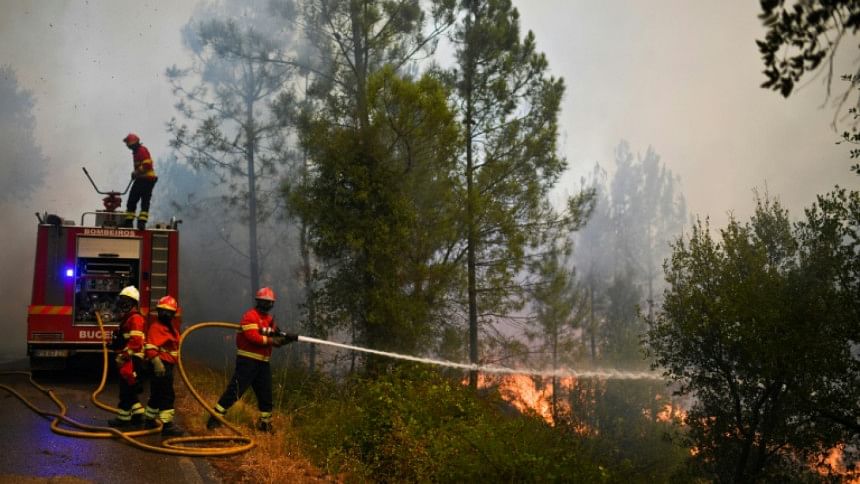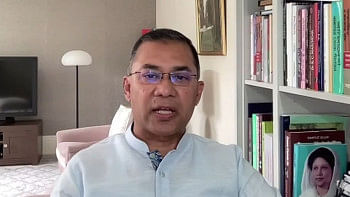Wildfires trap 2,000 villagers in Portugal

Forest fires cut off a village of 2,000 people in Portugal, as firefighters struggled Thursday to control two major blazes in the centre of the country, local officials said.
And with another wave of hot weather forecast, the government declared a state of emergency in some central and northern regions.
Summer has seen a record number of fires and Portugal's Interior Minister Constanca Urbano de Sousa has blamed arsonists and human negligence for most of them.
Vasco Estrela, the mayor of the embattled village of Macao, told the Lusa news agency: "It's impossible to leave or to enter Macao because of the flames and the smoke."
The fire, which broke out on Tuesday evening, grew stronger through Wednesday and by early Thursday had surrounded the village, he said, adding: "The fire is continuing unabated."
Already at the end of July, a major fire had destroyed between 80 and 90 percent of the village, he said.
The emergency services have had to remove around 130 people from nearby villages, said Patricia Gaspar, spokeswoman for Portugal's civil protection agency, the ANPC.
Authorities added that the fires have left 92 people injured, seven seriously.
The main road in the region was again cut off on Thursday. Fires also disrupted traffic on the highway that connects the capital Lisbon to Porto in the north.
But firefighters were most worried about the fires around Macao, which were continuing to advance on several fronts, she added.
The forecast of hotter weather in the coming days -- increasing the risk that old fire sites will rekindle or new ones break out -- convinced the government to declare the state of emergencies.
This year's fires are the deadliest the country has endured.
Blazes in mid-June near Pedrogao Grande in central Portugal -- about 40 kilometres north of Macao -- killed 64 people and injured more than 250 others.
The flames spread so fast that many people died trapped in their cars, caught in the fires as they tried to drive to safety.
To mark the two months since the tragedy, Portugal's President Marcelo Rebelo and Prime Minister Antonio Costa visited the affected region Thursday.
Costa promised that his government would "authorise reconstruction projects for the damaged homes."
A lethal summer
Firefighters and locals were also struggling Thursday to control fires in nearby villages, including Sardoal, near Vale Formoso and Alcaravela, AFP journalists at the scene said.
"We came here to help the firefighters as best we can, by putting out smaller fires for example," said volunteer Ines Azevedo, from neighbouring Mouriscas.
"In a situation this dire, any help is useful."
Already this month fires have injured 86 people, seven of them seriously, while authorities last week asked 40,000 people to leave the town of Abrantes -- about 20 kilometres from Macao.
As well as recent loss of life, the fires have destroyed 141,000 hectares so far this year, civil protection officials said Wednesday.
The exceptional heat and dry conditions, coupled with strong winds, helped explain the scale of the destruction, said Rui Esteves, commander of the ANPC.
Record numbers of 'arsonists'
Police on Wednesday said they had arrested 91 suspected arsonists since the beginning of the year. That was a record, said Interior Minister Constanca Urbano de Sousa.
"Most of the fires have been started by man, through negligence or malice," she said.
Firefighters have had to tackle a little over 10,000 separate fires so far this year -- 2,500 more than at the same period in 2016.
And after the lethal fires in June, Portugal has now had to call in international help.
Over the weekend, Spain sent 120 firefighters, 27 engines and three firefighting planes to help bolster the exhausted Portuguese teams -- part of a European Union programme of mutual aid in emergencies.
Morocco also sent one of its firefighting planes.
The lethal fires in June led to a debate in Portugal about management of the forests and the need for an overhaul of the emergency response plan.
In July, the parliament approved several measures aimed at cutting back on eucalyptus plantations -- the most common tree being planted in the regions hit hardest by the fires -- which is extremely flammable.

 For all latest news, follow The Daily Star's Google News channel.
For all latest news, follow The Daily Star's Google News channel. 



Comments